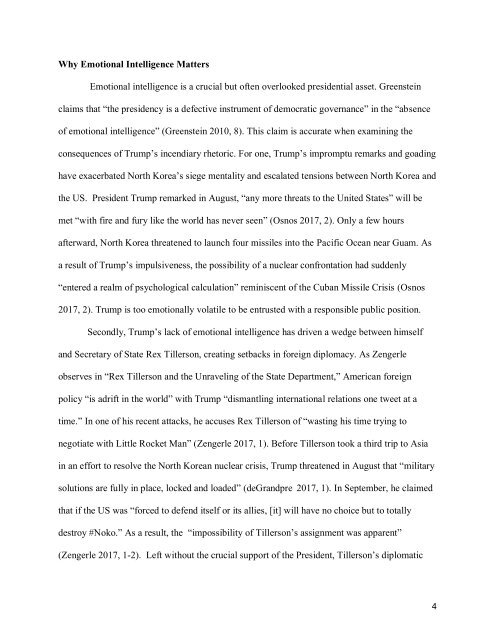In the Event of a North Korean Missile Crisis
Although President Donald Trump’s hardline rhetoric has stymied diplomatic talks with North Korea’s Kim Jong-un, the President is not the sole actor in international relations. Whether the two leaders are rational or emotionally intelligent will not bear as decisively on the simmering crisis as one may expect. Government actions and decisions are largely determined by existing organizations and bargaining among relevant players. In pinpointing the various factors that will influence American foreign policy with North Korea, the Cuban Missile Crisis is analyzed using the three conceptual models outlined in Graham T. Allison’s Essence of Decision: Explaining the Cuban Missile Crisis and "Conceptual Models and the Cuban Missile Crisis.” Though most analysts explain occurrences in foreign affairs as the rational and deliberate acts of united national governments, the Organizational Process Model (II) and the Bureaucratic Politics Model (III) offer more insightful and comprehensive explanations. Both Models II and III hold substantial predictive and explanatory power; using these two models, key lessons are extrapolated from the failures of the Kennedy administration and solutions to the North Korea crisis are proposed.
Although President Donald Trump’s hardline rhetoric has stymied diplomatic talks with North Korea’s Kim Jong-un, the President is not the sole actor in international relations. Whether the two leaders are rational or emotionally intelligent will not bear as decisively on the simmering crisis as one may expect. Government actions and decisions are largely determined by existing organizations and bargaining among relevant players. In pinpointing the various factors that will influence American foreign policy with North Korea, the Cuban Missile Crisis is analyzed using the three conceptual models outlined in Graham T. Allison’s Essence of Decision: Explaining the Cuban Missile Crisis and "Conceptual Models and the Cuban Missile Crisis.” Though most analysts explain occurrences in foreign affairs as the rational and deliberate acts of united national governments, the Organizational Process Model (II) and the Bureaucratic Politics Model (III) offer more insightful and comprehensive explanations. Both Models II and III hold substantial predictive and explanatory power; using these two models, key lessons are extrapolated from the failures of the Kennedy administration and solutions to the North Korea crisis are proposed.
Create successful ePaper yourself
Turn your PDF publications into a flip-book with our unique Google optimized e-Paper software.
Why Emotional <strong>In</strong>telligence Matters<br />
Emotional intelligence is a crucial but <strong>of</strong>ten overlooked presidential asset. Greenstein<br />
claims that “<strong>the</strong> presidency is a defective instrument <strong>of</strong> democratic governance” in <strong>the</strong> “absence<br />
<strong>of</strong> emotional intelligence” (Greenstein 2010, 8). This claim is accurate when examining <strong>the</strong><br />
consequences <strong>of</strong> Trump’s incendiary rhetoric. For one, Trump’s impromptu remarks and goading<br />
have exacerbated <strong>North</strong> Korea’s siege mentality and escalated tensions between <strong>North</strong> Korea and<br />
<strong>the</strong> US. President Trump remarked in August, “any more threats to <strong>the</strong> United States” will be<br />
met “with fire and fury like <strong>the</strong> world has never seen” (Osnos 2017, 2). Only a few hours<br />
afterward, <strong>North</strong> Korea threatened to launch four missiles into <strong>the</strong> Pacific Ocean near Guam. As<br />
a result <strong>of</strong> Trump’s impulsiveness, <strong>the</strong> possibility <strong>of</strong> a nuclear confrontation had suddenly<br />
“entered a realm <strong>of</strong> psychological calculation” reminiscent <strong>of</strong> <strong>the</strong> Cuban <strong>Missile</strong> <strong>Crisis</strong> (Osnos<br />
2017, 2). Trump is too emotionally volatile to be entrusted with a responsible public position.<br />
Secondly, Trump’s lack <strong>of</strong> emotional intelligence has driven a wedge between himself<br />
and Secretary <strong>of</strong> State Rex Tillerson, creating setbacks in foreign diplomacy. As Zengerle<br />
observes in “Rex Tillerson and <strong>the</strong> Unraveling <strong>of</strong> <strong>the</strong> State Department,” American foreign<br />
policy “is adrift in <strong>the</strong> world” with Trump “dismantling international relations one tweet at a<br />
time.” <strong>In</strong> one <strong>of</strong> his recent attacks, he accuses Rex Tillerson <strong>of</strong> “wasting his time trying to<br />
negotiate with Little Rocket Man” (Zengerle 2017, 1). Before Tillerson took a third trip to Asia<br />
in an effort to resolve <strong>the</strong> <strong>North</strong> <strong>Korean</strong> nuclear crisis, Trump threatened in August that “military<br />
solutions are fully in place, locked and loaded” (deGrandpre 2017, 1). <strong>In</strong> September, he claimed<br />
that if <strong>the</strong> US was “forced to defend itself or its allies, [it] will have no choice but to totally<br />
destroy #Noko.” As a result, <strong>the</strong> “impossibility <strong>of</strong> Tillerson’s assignment was apparent”<br />
(Zengerle 2017, 1-2). Left without <strong>the</strong> crucial support <strong>of</strong> <strong>the</strong> President, Tillerson’s diplomatic<br />
4


